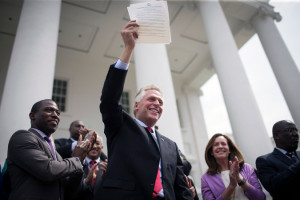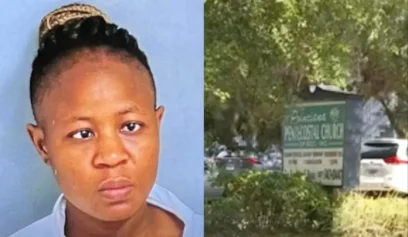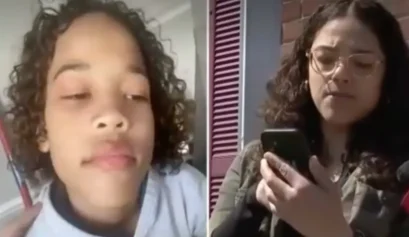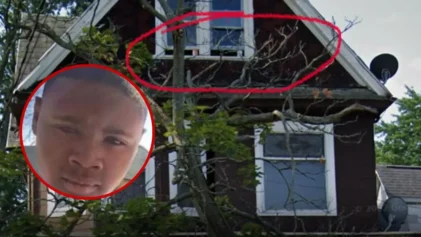
Gov. Terry McAuliffe hold up the signed executive order restoring the voting rights of former felons. Photo by Chet Strange/The New York Times
Virginia Governor Terry McAuliffe signed an executive order Friday that would restore the voting rights of residents with a felony criminal record. Gov. McAuliffe said the change was necessary as the state tries to part with its “slaveholder ways,” Think Progress reports. From this day forward, formerly disenfranchised felons will be able to exercise their right to vote, run for office, and serve on a jury.
“I have long struggled with the question of whether Virginia can fully address Lincoln’s call for a government by the people, of the people, and for the people, when we cut out so many people from full citizenship,” he said in an address from the state capitol. “This is the essence of democracy. Any effort to erode it dilutes it for all of us. So I believe it is time to cast off Virginia’s troubled history and restore the rights of these men and women.”
Virginia is one of a small handful of states that doesn’t automatically restore the voting rights of felons after they’ve served their sentence. But the reforms made by McAullife over the past two years have loosed those stipulations, making it possible for Virginians convicted with non-violent drug crimes to regain their right to vote. He also banned the practice of denying the civil rights of individuals who are unable to pay their court fees.
Per Think Progress, the changes are set to affect a quarter of Virginians, many of whom are African-American. Local faith leaders who spoke at the signing of the executive order pointed out that felon disenfranchisement laws were purposefully implemented in order to “eliminate the darkey as a political factor” and ensure the “complete supremacy of the white race in the affairs of government.” Such policies, enacted during the Civil War era, disenfranchises almost one in four Black Americans.
“There’s no question that we’ve had a horrible history in voting rights as relates to African-Americans — we should remedy it,” Gov. McAuliffe said in an interview Thursday, preceding the historic signing. “We should do it as soon as we possibly can.”
A Miami man named Desmond Meade is pushing for similar reforms in Florida. He has been busy collecting signatures for a ballot initiative to change the state constitution to allow those with felony records to have their voting rights restored after completing their sentence, probation or parole. The initiative is a personal one, as Meade is one of Florida’s 1.5 million residents banned from voting because of a felony record, according to Think Progress.
“If people are released back into society, they should be given every opportunity to successfully reintegrate into their communities,” Meade said. “But at this time, the language indicates what most voters will support.”
According to the Brennan Center for Justice at New York University, 20 other states have made similar reforms over the last two decades in order to ease restrictions on ex-felons and help them reintegrate into society.
Think Progress reports that Gov. McAuliffe urged newly eligible voters to go out and register to vote following Friday’s signing. He said he hopes the new policy will send an important message to those who were formerly disenfranchised and the rest of America.
“Virginia will no longer build walls and barriers to the ballot box. We will take them down,” McAuliffe said.


